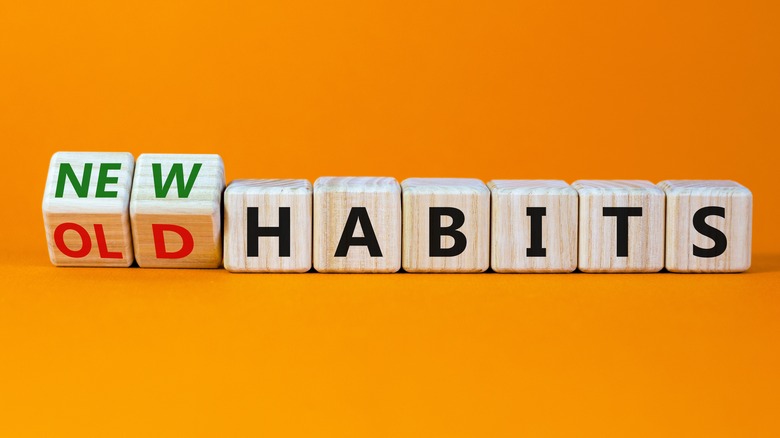Tips On How To Establish A Self-Care Routine
While there may have been a time when "self-care" was a term known by only a select few, these days, everyone's thinking about it.
In the last decade, searches for "self-care" on Google have skyrocketed in number (with a notable spike in March 2020 — we wonder what happened then?), according to Google Trends, with a UK-based survey finding that the majority of people desire a little more emphasis on looking after one's self in their lives (per Hearst UK). Wherever we look, we're told to practice self-care, to look after ourselves, and to give ourselves a little extra love. But in reality, between the pressures of work, family, friends, and just life in general, figuring out a robust approach to looking after ourselves is actually way harder than it looks — and too often, we end the day feeling strung out and desperate for sleep.
Well, not anymore, we say. While it can definitely be challenging to figure out what self-care looks like for you, it's essential to work it into your lifestyle. And we wanted to make it as easy for you as possible to do so, which is why we put together our top tips on how to create a self-care routine that lasts.
Remind yourself what self-care actually is
Before you embark upon a self-care journey, it's important to establish what the fairly nebulous term means, to ensure that we're doing it right. So, let's clarify.
"Self-care is something we deliberately do — or in some instances, refrain from doing — with our own well-being in mind," says psychologist Matthew Sacco (via the Cleveland Clinic). This can include practicing a range of activities or habits (or, conversely, keeping away from bad activities or habits), but generally, the things that you include in your self-care routine should bolster your emotional, physical, or psychological well-being, as Sacco states.
While self-care can be, in theory, whatever makes you feel good without compromising your health, it's useful to cluster your activities around these areas. Self-care around physical health might look like trying to eat better or exercise more regularly, for example, while psychological and emotional self-care could mean spending a little more time with friends or staying away from potentially triggering situations. Self-care can also be spiritually based, and may include spending time observing religious activities, going outdoors more often, or simply making space to reflect. Whatever you add to your routine, just make sure it leaves you feeling grounded and at peace.
Begin by starting small
The idea of revamping your entire lifestyle to imbue it with ultimate wellness can be pretty overwhelming. But to get started, all you need to do is plant some small seeds, and watch them grow into big changes to your wellbeing. A great way to begin is by writing down all of the things that make you feel happy, says Fairfield University department of psychological and educational consultation chair and associate professor Paula Gill Lopez (via Everyday Health). Then, consider how you might start to add them into your life.
Bear in mind, though, that these things don't necessarily need to be active: It could be as simple as lighting a scented candle so that you have a nice-smelling room. Elsewhere, small, active changes can make big differences, like finishing your shower with a blast of cold water to perk up your mood and your circulation (per Good Housekeeping).
Whatever you decide on, though, try to incorporate your joy-making elements one at a time, finding ways for them to seamlessly slip into your lifestyle. Trying to throw everything in there all at once may leave you feeling overwhelmed.
Identify your self-care goals and how you'll get there
Practicing self-care is going to make you feel good most of the time, but if you want to maximize its effect, it's good to have goals. Identifying what you want to achieve from your self-care, how you're going to get there, and how long it's going to take you is key to creating lasting change (per the Cleveland Clinic).
One of the best ways to do this is by implementing the S-M-A-R-T method when choosing your self-care activities, says psychologist Matthew Sacco. The things you're choosing, or the new goals you're looking to achieve from your lifestyle, should be Specific, Measurable, Achievable, Relevant, and Time-bound. To add to this, it's advisable to think about your self-care activities as a sort of tiered system. "Practicing self-care every day is important. Daily activities should be different than activities you do weekly, monthly and even yearly," he says. You might, for example, do some yoga or take a hot bath as a daily activity, go for one long run in nature every week, have a night out with your buddies once a month, and go somewhere in the world you've always wanted to go once per year.
Remember that self-care isn't just when you're awake
It's tempting to think of self-care as something we actively do (e.g., going to the gym, heading out to the shops for some retail therapy, or cooking a nice meal). Sure, all of those things can make you feel better — but true self-care also lies in switching off effectively. This is why getting enough quality sleep is so important for proper self-care, as Psychology Today discusses. When we don't sleep adequately, it can make us feel tired (naturally) and stressed — and it may impact our physical well-being, too.
But how do we get better sleep? It all lies in the preparation. Ensure that your diet permits you to sleep effectively by avoiding caffeine and heavy meals in the hours before you go to bed. Your room should be an environment that you feel at ease in, too. Ideally, you should keep electrical equipment and screens out of your sleeping space. If you're still finding it hard to sleep, it could be because of other factors in your life, like stress. If this is the case, make sure that you're making enough time between your daily activities and your sleep time to decompress and maybe do a little meditation before bedtime.
Schedule your self-care moments
Look, we don't want to rob you of all spontaneity when it comes to your self-care habits, but life is hectic. You can be working your way through the day, intending to practice self-care later on at some point, and then all of a sudden your boss calls with an urgent task, and ... It all goes out of the window.
That's why it's vital to actively incorporate your self-care time into your regular schedule to make sure you're getting it. "Think about creating time for self-care within your regular routine instead of keeping it separate," GraceMark Wellness & Lifestyle Coaching founder and certified health and wellness coach Samantha Markovitz says (via Prevention). By carving out specific times in your day instead of treating self-care as something you'll get around to, you'll reap the benefits of it way more actively. It's also useful to treat your self-care activities with the same importance as you'd hold meeting a friend or a work call, Markovitz advises, as this will help you stick to it way more effectively.
Your self-care needs might change as you grow
So here's the thing: Life is long and full of twists and turns. We may feel like a completely different person at the end of the year than we did at the start of it. With that said, remember that your self-care routine and desires can — and should — change, too.
"We're talking about a practice, we're talking about trial and error, and we're also talking about our needs changing over time," says Washington-based psychologist Ellen K. Baker via Everyday Health. We might find, over time, that our former self-care habits no longer serve us, and we need to swap them out for something else.
The best way to recognize this is to check in with your activities regularly and assess whether they're giving you the same sense of peace and security they always did. General habits like a healthy diet and sleeping pattern will always be useful on a self-care level, but you might find that instead of reading a book before bed, you want to do some meditation or call your daughter to chat instead. And that's okay! Don't be afraid to let go of things that aren't benefiting you anymore.
Consider your diet
In a sense, everything starts with our diets. What we eat is the cornerstone of our health, and keeps our bodies full of nutrients and better equipped to combat lifelong, chronic conditions (per the World Health Organization). And on a self-care level, there are few things more important than keeping your diet healthy. Our diets can have an enormous effect on how we feel not only physically, but mentally too, with a healthy diet leading to a better mood overall, more focus and clarity, and feeling more awake, says Mind.
Understandably, revamping our diets entirely is a pretty gargantuan task. So that's why we recommend starting with small tweaks to introduce some more nutritious elements onto your plate. Try adding a source of healthy fats into your daily diets, like a handful of nuts and seeds or some oily fish (per Forbes). "Sixty percent of our brain is fat. So we need healthy fats for a healthy brain," advises "The Happiness Diet" author and mental health advocate Rachel Kelly.
Adding an extra portion or two of vegetables and fruit into your meal plan can also make you feel much better, and provides you with essential vitamins, minerals, and antioxidants required to keep the body and mind in good working order.
Establishing habits takes time, so be patient
As the old saying goes, "Rome wasn't built in a day." And neither is a quality self-care routine. Habits can take a long time to form, with a study published in the European Journal of Social Psychology finding that creating a new, lasting habit can range from anywhere between 18 and 254 days. Per the study, the average time taken for a habit to become part of your everyday process is 66 days, or well over two months.
However, although we can't expect our self-care activities to become routine overnight, there are some ways that we can encourage forming better habits more effectively. One way is to simply swap out an old habit for a new one, according to Healthline. This can have a surprisingly positive effect: If you're trying to cut down on unhealthy snacks, for example, swapping your candy bar for an apple can in time become a lasting habit that may make you feel better. When it comes to habit-forming, though, the main thing is to practice consistency. Soon enough, that self-care activity will feel like riding a bike.
To stay on track, get an accountability buddy
Look, no person is an island. And even when we're dealing with something as nice as self-care, it can still be difficult to make ourselves do things some of the time. That's why getting yourself an accountability buddy — so you can keep each other on track for your self-care goals — is a great idea.
"In my years of working with thousands of people, there's one thing that drives accountability more than anything else: If you want to keep people doing a behavior, get a buddy," says exercise and obesity expert Tim Church (via the New York Times). Accountability buddies not only keep you on track with their sheer presence and the feeling of needing to keep them in the loop, but they can also support you when times get tough, offer advice when needed, and celebrate your wins with you.
If you'd prefer to keep your self-care journey private, you can still achieve accountability — just do it to yourself. Set yourself reminders to complete self-care tasks, or keep a journal where you can take note of all of the changes you've made. Soon, you'll be celebrating yourself every day!
Learn to say no
If you're anything like us, you find it hard to let people down. Like, super hard. But oftentimes, the act of saying "yes" to everything — from social arrangements to work tasks — can leave you totally spent and exhausted. Saying "no," however, is one of the most radical acts of self-care you can do, as Psychology Today notes.
When we say no, we create a boundary for ourselves, be that in a social or relationship setting or a work-based one. This can have powerful effects on our confidence and self-realization. It can also create precious space for yourself, like if you're saying no to a party because you've over-exerted yourself recently. This will allow you to preserve energy, feel more grounded, and therefore be a better person for when people need you.
But we're not going to lie to you, saying no can be tricky. To soften the blow, it's often useful to "sandwich" the declining of an offer or invitation by a friend between other positives, or a commitment to spend time together in the future. Remember, too, that sometimes, it's equally as important to say "yes" to life, and to embrace what it throws at you — so keep an eye on when saying no can become less pleasurable.
Be smart with your habits
Habit-forming can be tough, and it can be tougher still to tack on a new habit to an already-busy schedule and expect it to stick. Anyone who's ever watched the U.S. Open, bought a tennis racket, played two games, and then given up, can attest to this fact. (Not us. Definitely not us.) But being smart with your habits and trying to incorporate them at key moments will help make them a part of your day-to-day life.
One way to do this is with the "sandwich" principle. "When you add a new habit, sandwich it between two habits you consistently practice consecutively," advises "Force of Habit: Unleash Your Power by Developing Great Habits" author Tamsin Astor (via Prevention). If you want to start doing a little yoga in the evenings, for example, place it between making your bed and showering. By doing this, you're much more likely to keep to the habit, says Astor, especially if you're doing it at the same time and in the same place every day. Then, once you've successfully incorporated that habit, you can get started on a new one.
Don't lose hope if you fall off the wagon
Self-care can be a wonderful, affirming thing, but it can also be very easy to forget to do it. And when that happens, it can be just as easy to punish ourselves, to feel like a failure, and to feel reluctant to try again. The thing is, it's natural for this to happen. "Lapses are going to happen. So it's really important to be forgiving of yourself when it happens," says psychologist Matthew Sacco (per the Cleveland Clinic). Sometimes, life just gets in the way, and sometimes you just need to take some time away from your self-care practices — and that's totally fine to do.
Whatever your reason is for encountering trouble with your self-care, however, one thing is more important than anything: Don't give up. Take stock of how your life looks post-lapse, and try to figure out how you can re-incorporate self-care activities, or adjust to your new situation. And try as much as possible to avoid comparison, too — what works for one person might not work for you, and the main thing is to keep adapting as you go.
Remember the benefits of exercise
Of all the things you can do to practice better self-care, few are more effective or worthwhile than regular exercise. Getting just 30 minutes of exercise every day has an almost indescribable amount of benefits, as Amherst College points out. Regular exercise will give you way more energy than you had before, provide powerful benefits to your mood and mental health, and help you drop off easier at the end of the day. And on a physical level, regular exercise has been consistently linked with lower incidences of long-term chronic conditions like heart disease, stroke, diabetes, or depression.
And most importantly of all? Exercise is really fun. Sure, it may not feel like it before you go for a run, but there are ways to make it way more enjoyable for yourself. Go to an exercise class with a friend, or take a jog in your favorite park. If you find that you're getting bored or stuck in your exercise regime, try something new entirely, to focus on different parts of the body and keep things interesting. As with other aspects of self-care, though, the most important thing to do is try and create a set time each day to exercise. Doing so will lead to big benefits.
Above all, don't forget how important self-care actually is
When we discuss self-care, it's quite tempting to think of it as an additional luxury to our lives, a nice thing to try and practice if we can, but not exactly essential. But that's far from the case.
As research published by the National Association of School Psychologists states, stress is rife in our society, and is exacerbated by tough working conditions and an inability to detach from work. The vast majority of U.S. citizens report feeling stress weekly, with 15% of people stating that they feel stress every day of their lives (per a survey from ValuePenguin). And when it accumulates too much, all of this stress can result in burnout, a feeling of being exhausted and overwhelmed (per WebMD).
Practicing self-care allows us to step back from the stresses in our life, carve out time to do the things we really want to do, and regain balance. That's why it's vital to treat your self-care activities with importance and make time for them regularly.















